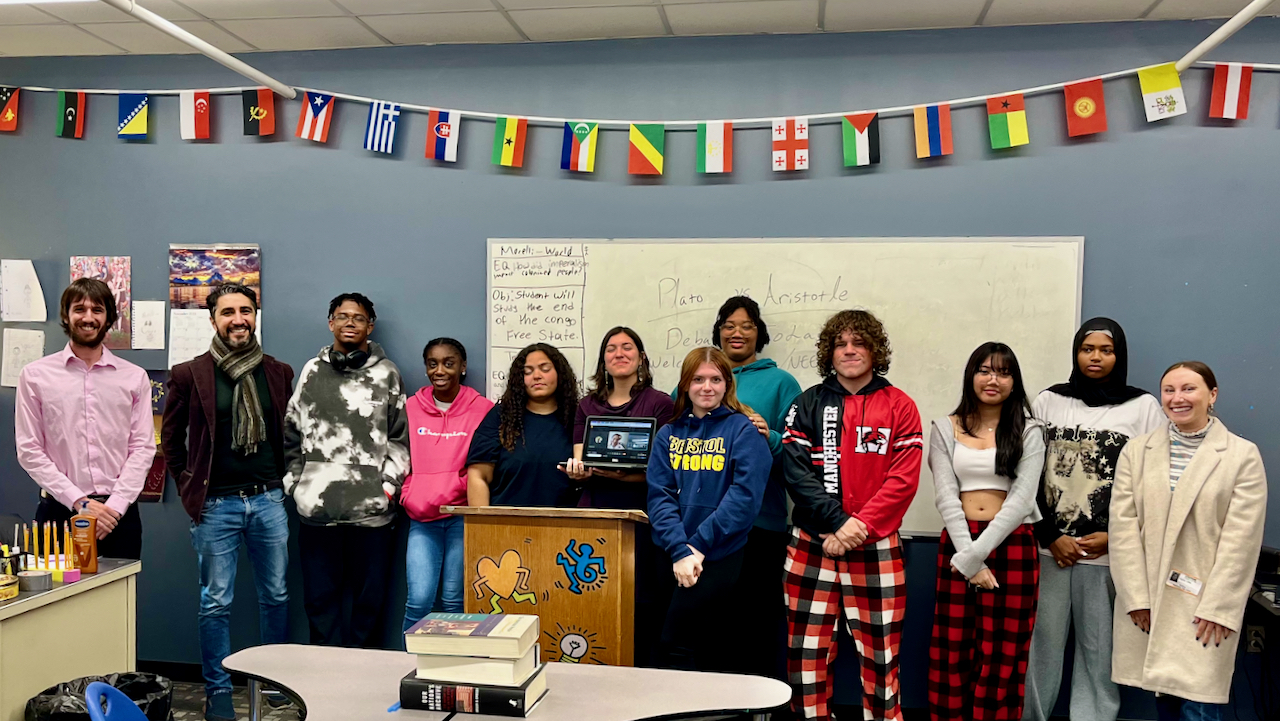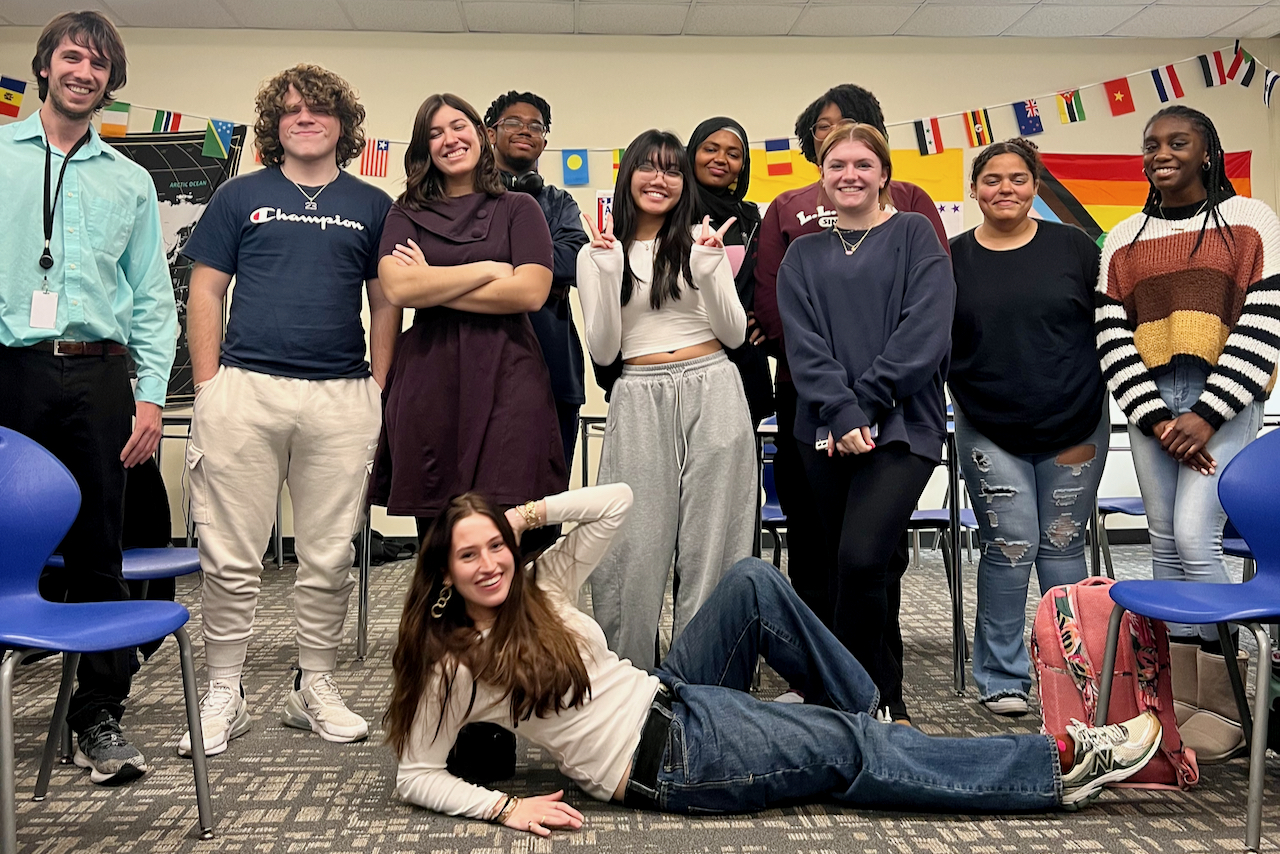High School Students ‘Live Like A Philosopher’ Through Partnership

Students from high schools across the country are getting the chance to “live like a philosopher” thanks to a Wesleyan course taught by Tushar Irani, Associate Professor of Philosophy and Letters.
The course is offered through Wesleyan’s partnership with the National Education Equity Lab—an initiative that seeks to democratize college access and advance education justice by providing college-level courses to students attending Title 1 high schools across the country. (The New York Times wrote about the program previously.)

There are six high schools participating in the course—from Albuquerque to El Paso to the Bronx—with a total of over 75 students enrolled.
“The course has really been a team effort,” says Irani. “My role’s mainly been on the content creation side during the semester, producing video lectures on the philosophers and readings we’re studying in each unit, all of which is mediated each week by high-school teachers in person with students and by a group of Wesleyan undergrads serving as Teaching Fellows who lead weekly discussion meetings on the material over Zoom.” Jeffrey Goetz, Associate Director for the Center for Pedagogical Innovation, manages and oversees the program at Wesleyan.
A core component of the course (called “Live Like a Philosopher: Ethics and Civics in the Ancient World”) involves taking the theoretical views of four philosophical approaches to the good life in the Greek and Roman world—drawn from the writings of Plato, Aristotle, the Epicureans, and the Stoics—and putting them into tangible practice. “I find a project-based method for the study of ancient philosophy a really effective way to motivate interest in the material,” Irani says. In addition to the close reading and analysis of philosophical ideas, each unit of the course contains a week of daily exercises based on the ethical views of a specific thinker or school, providing students with the opportunity to explore and evaluate each view in terms of its application to their lived experience.
“The course functions both as an introduction to Greco-Roman ethics and as an introduction to philosophy itself,” Irani continued, noting that philosophy as a discipline is rarely taught at the pre-college level. While the content revolves around various notions of the good life, because the study of ethics was often connected in the ancient world with the study of logic, epistemology, and metaphysics, students are also introduced to those subjects. “Making the discipline of philosophy accessible to all students is so important,” Irani says, referring to the words of the Roman philosopher Seneca, whom he quotes in the welcome video to the course: “If there is any good in philosophy, it is this—that it never looks into pedigrees.”
Wesleyan is currently offering two courses through the National Education Equity Lab this semester: Irani’s course and Introduction to Programming, taught by Kelly M. Thayer, Associate Professor of the Practice in Integrative Sciences. During the spring semester, Wesleyan will offer Introduction to Psychology, taught by Lisa C. Dierker, Walter Crowell University Professor of Social Sciences, and Introduction to Sociology, taught by Robyn Autry, Associate Professor of Sociology. There are also tentative plans to offer additional courses during the next academic year.
“The point of the Ed Equity Lab work is much larger than offering a free credit-bearing course. The point is to give the students in underserved high schools a chance to excel at challenging intellectual work and show them that they belong in a top-notch college or university,” said President Michael S. Roth ’78 in an Inside Higher Ed essay on his experience teaching in the program.
Irani recently made a visit to a participating high school in Manchester, Conn. “It was the same day students were assigned a midterm debate comparing Plato and Aristotle,” he said, adding: “I was floored by their insights. It’s been really heartening to see the way students have taken to the material—and the multilayered, multimodal pedagogical format creating close collaborative relationships between college professors, undergraduate students, and high-school teachers is one of the key reasons the Ed Equity model is such a success. They’ve figured out a unique and powerful way to facilitate online learning.”
The Wesleyan students serving as Teaching Fellows in the course include Clio Gourevitch ’26, Natalie Horberg ’25, Josh Kleiman ’24, Maddy Barket ’24, Megan Koenigsberg ’24 and Orly Meyer ’24. All of them are familiar with the material from prior coursework with Irani at Wesleyan and facilitate online discussion sections over Zoom with the assistance of a Lead Teaching Fellow, Sebastian Evans ’23, now pursuing a PhD in philosophy.
Maddy Barket ’24, who worked with the Manchester High School students as a Teaching Fellow, said she truly enjoyed seeing how the students connect the material from the class to their everyday lives. “When a philosophical approach can provoke a student to think differently about their lives and their worlds, whether desirable or not, an intentional engagement with the text and our classroom discussions is highlighted—their abilities to go beyond the text, transport it into the modern day, and wrestle with its implications is by far the most rewarding thing to witness as a Teaching Fellow,” Barket said.
This course is an ancestor of the large comparative philosophy course, “Living a Good Life,” which Irani teaches each year at Wesleyan with Steven Horst, Professor of Philosophy, and Stephen Angle, Mansfield Freeman Professor of East Asian Studies. The difference is that this course focuses only on Greek and Roman philosophers. “I’ll be teaching it again in the spring as a first-year seminar for Wesleyan students,” Irani said, “and I plan to provide them with all the video content I’ve created this past semester, flipping the classroom so we can spend all our time in person discussing the ideas.”
As the high school students studied these various ancient philosophical texts, they ended up teaching Barket about new and critical ways to engage with them. “Their minds have freshened my eyes and I believe this is the ultimate goal in any learning environment: to learn alongside your peers, professors, and fellow students,” she said. “I had a professor who always sat down with his students during class, as opposed to standing and lecturing at the front of the room. He would often express how much he learned from us, and the ways in which we reshaped his thinking—this is a quality I deeply admire and have tried to emulate with the students because it fosters trust and comfort within a learning environment.”

